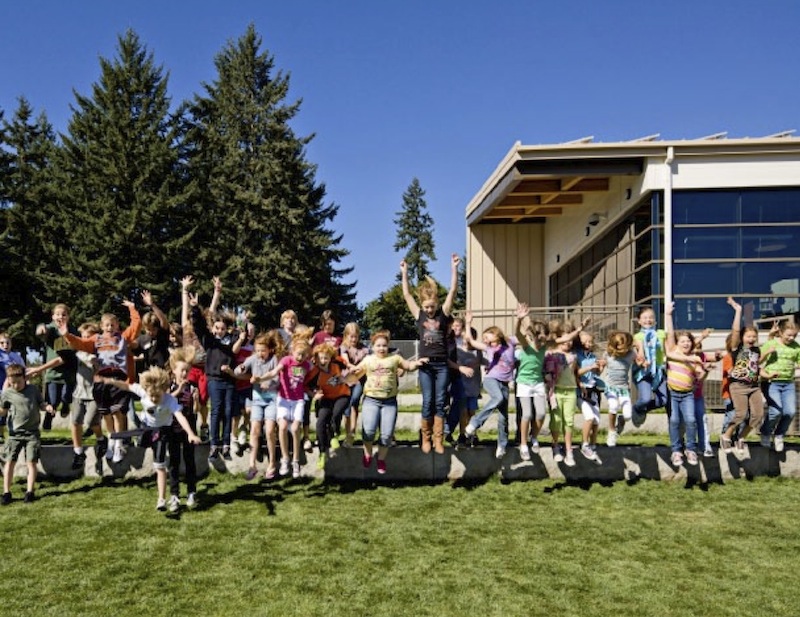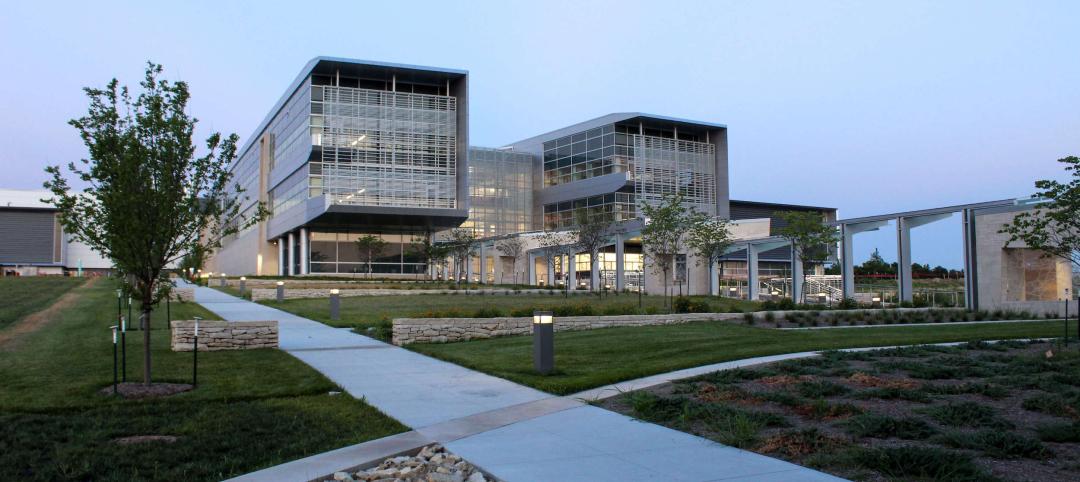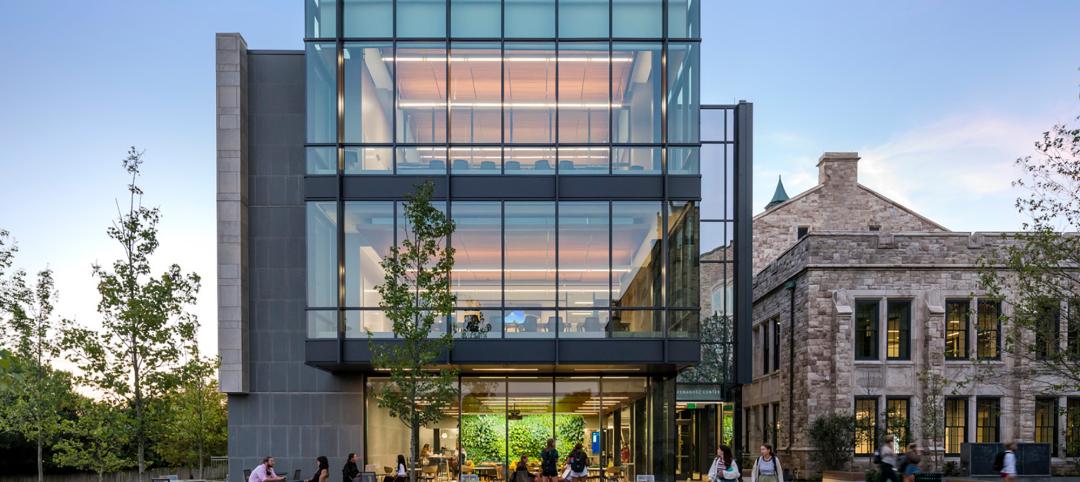DLR Group and the Institute for the Built Environment (IBE) at Colorado State University have collaborated on a research project to evaluate the effect of green school design on occupants and long-term building performance. IBE recently published the research report titled, "Linking Performance & Experience – An Analysis of Green Schools."
The findings show schools designed by DLR Group are more energy efficient, provide more space per student, and are constructed for less cost compared to regional averages for schools constructed during the same year. The overwhelming perception of school staff is that the learning environments within DLR Group green schools have a positive impact on health, achievement, and behavior.
“Design does not stop when the school opens," said DLR Group Senior Principal Jim French, AIA, who leads the firm’s K-12 practice. "The design process must include coming back to a project to measure building performance. If both the tangible metrics of energy efficiency and the intangible metrics of student and occupant satisfaction are not being evaluated, then as design professionals we are not truly meeting the needs of our K-12 clients and the communities they serve.”
The IBE researched 12 schools in eight states offering preschool through 8th grade instruction. IBE evaluated P-8 schools because these facilities offer a more controlled and consistent operational environment for study. For the purposes of the study, the schools in the research sample were third party certified or align with criteria for certification as sustainable buildings, and were in operation for at least 12 months.
The key findings include:
- A motivator to improve student health was only mentioned by a handful of respondents. However, when asked specifically about student health, 87% of respondents reported that they perceived a positive impact on student health, with most respondents specifically describing the positive impact of daylighting.
- 85% of respondents reported that their health and productivity were positively affected by the building.
- 71% of respondents perceived that the building has a positive effect on student achievement
- 71% perceived a positive effect on student behavior. For those that who did not share this perspective, many stated that it is very hard for them to identify the effect because of the many other variables which influence student achievement and behavior.
- Green building practices did not necessarily result in higher first costs. Out of the 10 sites in this sample, six were built for below the regional median cost for schools built in the same year, while four were built for costs greater than the regional median.
- The sample mean Energy Star score was 81, which indicates that the buildings are operating in the top 19th percentile. Nine out of the eleven building evaluated for Energy Star have a score over 75 and would receive the Energy Star award.
- Eight schools are operating at or better than the 2030 Challenge 50% reduction target. In addition, by organizing the schools by the year constructed, it is clear that over time the buildings' design has become increasingly more efficient.
Download the DLR Group/CSU high-performance schools study (PDF).
Related Stories
Mass Timber | Jul 11, 2023
5 solutions to acoustic issues in mass timber buildings
For all its advantages, mass timber also has a less-heralded quality: its acoustic challenges. Exposed wood ceilings and floors have led to issues with excessive noise. Mass timber experts offer practical solutions to the top five acoustic issues in mass timber buildings.
Multifamily Housing | Jul 11, 2023
Converting downtown office into multifamily residential: Let’s stop and think about this
Is the office-to-residential conversion really what’s best for our downtowns from a cultural, urban, economic perspective? Or is this silver bullet really a poison pill?
Adaptive Reuse | Jul 10, 2023
California updates building code for adaptive reuse of office, retail structures for housing
The California Building Standards Commission recently voted to make it easier to convert commercial properties to residential use. The commission adopted provisions of the International Existing Building Code (IEBC) that allow developers more flexibility for adaptive reuse of retail and office structures.
Laboratories | Jul 10, 2023
U.S. Department of Agriculture opens nation’s first biosafety level 4 containment facility for animal disease research
Replacing a seven-decade-old animal disease center, the National Bio and Agro-Defense Facility includes the nation’s first facility with biosafety containment capable of housing large livestock.
Adaptive Reuse | Jul 6, 2023
The responsibility of adapting historic university buildings
Shepley Bulfinch's David Whitehill, AIA, believes the adaptive reuse of historic university buildings is not a matter of sentimentality but of practicality, progress, and preservation.
Market Data | Jul 5, 2023
Nonresidential construction spending decreased in May, its first drop in nearly a year
National nonresidential construction spending decreased 0.2% in May, according to an Associated Builders and Contractors analysis of data published today by the U.S. Census Bureau. On a seasonally adjusted annualized basis, nonresidential spending totaled $1.06 trillion.
Architects | Jul 5, 2023
Niles Bolton Associates promotes Jeffrey Smith, AIA, to President and C. Cannon Reynolds, AIA, to Managing Director
Niles Bolton Associates (NBA), a leading architecture, planning and design firm, announces leadership changes as a part of its ongoing commitment to future growth. Current Executive Vice President, Jeffrey Smith, AIA, has been named President and C. Cannon Reynolds, AIA, has been named Managing Director effective June 30, 2023.
Mixed-Use | Jun 29, 2023
Massive work-live-play development opens in LA's new Cumulus District
VOX at Cumulus, a 14-acre work-live-play development in Los Angeles, offers 910 housing units and 100,000 sf of retail space anchored by a Whole Foods outlet. VOX, one of the largest mixed-use communities to open in the Los Angeles area, features apartments and townhomes with more than one dozen floorplans.
Office Buildings | Jun 28, 2023
When office-to-residential conversion works
The cost and design challenges involved with office-to-residential conversions can be daunting; designers need to devise creative uses to fully utilize the space.
Architects | Jun 28, 2023
CSHQA hires first CEO in company's 134-year history
The Board of Directors of CSHQA announced the appointment of Ryan D. Martin, AIA NCARB as Chief Executive Officer.

















